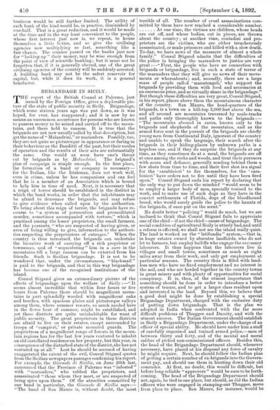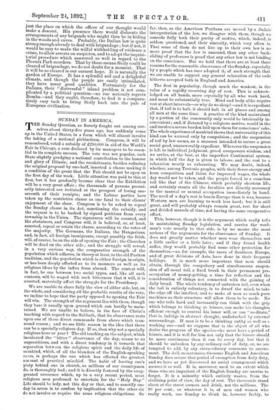BRIGANDAGE IN SICILY. T HE report of the British Consul at
Palermo, just issued by the Foreign Office, gives a deplorable pic- ture of the state of public security in Sicily. Brigandage, which some sixteen years ago was put down, as it was hoped, for ever, has reappeared ; and it is now by no means an uncommon occurrence for persons who are known to possess money to be seized and carried off to the moun- tains, and there held to ransom. It is true that the brigands are not now usually called by that description, but get the name of " Malandrini," or marauders. Possibly, too, they are not quite so picturesque in appearance or daring in their behaviour as the Banditti of the past, but their modes of operation and the results of their acts are substantially the same. One would as soon have one's throat cut by brigands as by Malandrini. The brigand's plan of campaign is simple enough. In the first place, the formation of a band or company is necessary— for the Italian, like the Irishman, does not work well, even in crime, unless he has companions and can feel that he is a member of an Association which is bound to help him in time of need. Next, it is necessary that a reign of terror should be established in the district in which the band works, in order that the inhabitants may be afraid to denounce the brigands, and may refuse to give evidence when called upon by the authorities. To bring about this reign of terror, the brigands have re- course to " a system of persecution and premeditated murder, sometimes accompanied with torture," which is practised among the lesser proprietors, the small farmers, and the peasants, " who are suspected of having given, or even of being willing to give, information to the authori- ties respecting the perpetrators of outrages." When the country is thus terrorised, the brigands can undertake the lucrative work of carrying off a rich proprietor or townsman, and of " sequestering " him in a cave in the mountains till a large ransom can be extorted from his friends. Such is Sicilian brigandage. It is not to be wondered that, under the circumstances, " blackmail" is paid to the brigands, and that in this way brigandage has become one of the recognised institutions of the island.
Consul Stigand gives an extraordinary picture of the effects of brigandage upon the welfare of Sicily :—" It seems almost incredible that within four hours or five hours from Palermo there should be magnificent moun- tains in part splendidly wooded with magnificent oaks and beeches, with spacious plains and picturesque valleys among them, where summer resorts, so much needed here in the fierce heat of summer, might be established, and yet these districts are quite uninhabitable for want of public security. The great proprietors in these districts are afraid to live on their estates, except surrounded by troops of campieri,' or private mounted guards. The proprietress of a magnificent range of forests in the moun- tain regions has for the last few years ventured to inhabit an old castellated residence on her property, but this year, in consequence of the disturbed state of the district, she has not ventured up at all." Lest he should be accused of having exaggerated the extent of the evil, Consul Stigand quotes from the Sicilian newspapers passages confirming his report. For example, the Giornale di Sicilia, on June 26th last, announced that the Province of Palermo was " infested " with " marauders," who robbed the proprietors, and assassinated " those whom they meet, or are suspected of being spies upon them." Of the atrocities committed by one band in particular, the Giornale di Sicilia says :- " The band of San Mauro is, without doubt, the most terrible of all. The number of cruel assassinations com- mitted by them have now reached a considerable number.
At one time, the victims are children, whose heads are cut off, and whose bodies, cut in pieces, are thrown about the country ; at another time, contadini and pro- prietors are the victims, who are either treacherously assassinated, or made prisoners and killed with a slow death. To-day, we have news of the massacre of almost a whole family." Consul Stigand admits that the difficulties of the police in bringing the marauders to justice are very great :—" First, the people who have no connection with brigands or brigandage, lice in such a state of terror of the marauders that they will give no news of their move- ments or whereabouts ; and, secondly, there are a large mass of people called manutengoli,' who support the brigands by providing them with food and necessaries at an enormous price, and so virtually share in the brigandage." But though these difficulties are very great, Consul Stigand, in his report, places above them the mountainous character of the country. San Mauro, the head-quarters of the brigands, is a town on a hill-top 3,000 feet above the sea, and all around are mountains traversed by mule-tracks and paths only thoroughly known to the brigands :- " The mountains abound in caves, known only to the brigands and shepherds of the mountains, and as the armed force sent in the pursuit of the brigands are chiefly young men from Continental Italy, ignorant of the country and unable to speak the language, their search after the brigands in their hiding-places by unknown paths is a hopeless one, and if they do surprise the brigands at any time, as they sometimes do at a meal, the brigands are off at once among the rocks and woods, and treat their pursuers with scorn and defiance, generally sending behind them a few shots from time to time, and their first shot is a signal for the carabinieri ' to fire themselves, for the cara- binieri ' have orders not to fire until they have been fired upon." Consul Stigand ends his report by declaring that the only way to put down the mischief "would seem to be to employ a larger body of men, specially trained to the work, and to make use of such dogs as they have in the convict settlements of Florida, dogs of the bloodhound breed, who would surely guide the police to the haunts of the brigands, if once put on the scent."
No doubt better "policing " would do much, but we are inclined to think that Consul Stigand fails to appreciate one of the chief—if not the chief—cause of brigandage. The social condition of agricultural Sicily is utterly bad, and until a reform is effected, we shall not see the island really quiet. The land is worked on the " latifundia" system,—that is, in huge estates owned by absentee landlords, who do not let to farmers, but employ bailiffs who engage the necessary labourers. It thus happens that the labourers live in villages and small towns, sometimes as much as eight miles away from their work, and only get employment at particular seasons. The country thus is filled with land- less men who have no fixed employment and no interest in the soil, and who are herded together in the country towns in great misery and with plenty of opportunities for social conspiracy. It is, then, of the utmost importance that something should be done in order to introduce a better system of tenure, and to get a larger class resident upon and interested in the land. Beyond this, we believe that a good deal might be done by establishing a special Brigandage Department, charged with the exclusive duty of putting down brigandage. That is the plan we adopted in India when confronted with the far more difficult problems of Thuggee and Dacoity, and with the utmost success. The Italian Government should establish in Sicily a Brigandage Department, under the charge of an officer of special ability. He should have under him a staff of carefully organised and trained armed police,—men of between thirty and forty, and of the mental and moral calibre of picked non-commissioned officers. Besides this, the head of the Brigandage Department should, whenever necessary, have placed at his disposal any force of cavalry he might require. Next, he should follow the Indian plan of getting a certain number of ex-brigands into the Govern- ment pay, and should use them in hunting down their old. comrades. At first, no doubt, this would be difficult, but before long reliable "approvers " would be sure to be forth- coming. The head of the Brigandage Department should not, again, be tied to one place, but should, as did the Indian officers who were engaged in stamping-out Thuggee, move from place to place. San Mauro, for instance, would be just the place on which the officer of our thought would make a descent. His presence there would dislocate the arrangements of any brigands who might then be in hiding in the woods and caves. Probably, the Italian law is quite strong enough already to deal with brigandage ; but if not, it would be easy to make the wilful withholding of evidence a crime, to allow arrests on suspicion, and to adopt the inquisi- torial procedure which answered so well in regard to the Phcenix Park murders. That by these means Sicily could be cleared of brigandage, we do not doubt for a moment. That it will be so cleared is our earnest hope. It is naturally the garden of Europe. It has a splendid soil and a delightful climate, and though the people are easily intimidated, they have many good qualities. Fortunately for the Italians, their " distressful " island problem is not com- plicated by a political question—no one seriously regrets Bomba—and they ought, therefore, to find it a compara- tively easy task to bring Sicily back into the pale of European civilisation.



































 Previous page
Previous page